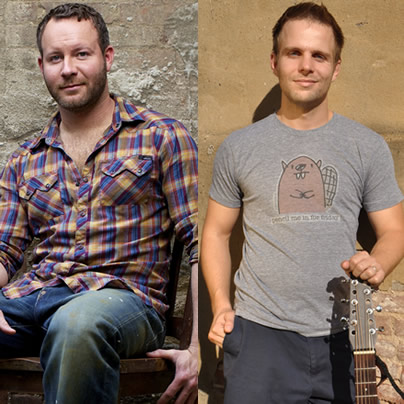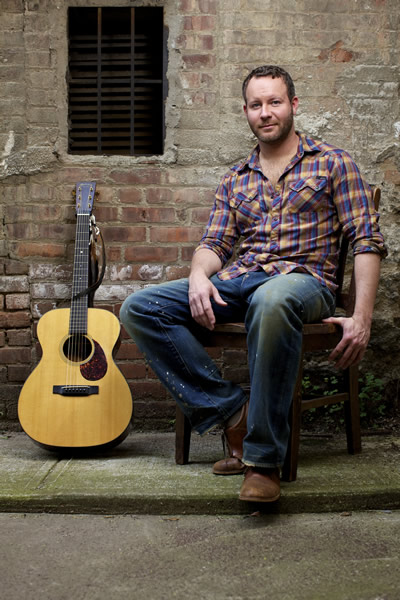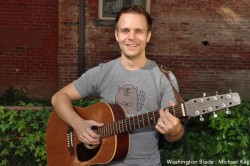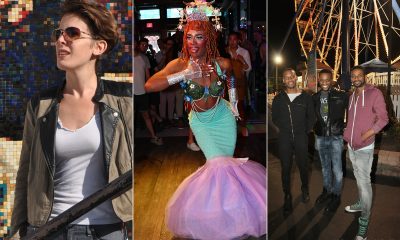Arts & Entertainment
A winning combination
Classical vet Alber joins D.C.-based Goss for Sunday performance

Matt Alber and Tom Goss
Sunday at 8 p.m.
Atlas (1333 H St., N.E.)
General Admission is $20; VIP $50

Matt Alber, who won fame for his barber shop-set video ‘End of the World,’ won two Grammys for his work in the classical ensemble Chanticleer. (Photo courtesy Alber)
When singer/songwriters Matt Alber and Tom Goss last performed together in Washington, the city was buried under 20-35 inches of snow. Despite the abnormally awful weather, people came out to hear their acoustic love songs.
Now the two are reuniting at Atlas (1333 H St., N.E.) on Sunday evening. Coming from opposite ends of the country, Alber brings his guitar from San Francisco to join the D.C.-based Goss to sing about finding love, losing love and starting anew.
Though the pair may sing about similar things, both say that their styles are very different.
“Matt has a flawless voice, his arrangements are beautiful,” Goss says. “Mine are a little more aggressive than his. People typically say that mine are working class love songs, a little grittier. It is not perfect.”
Alber, a two-time Grammy winner, began his musical career when he joined the group Chanticleer, a classical vocal group that performs baroque and renaissance music. When he first entered pop music, Alber and Goss admired each other’s music from afar.
“We met in San Francisco in 2009 and Tom showed me the ropes,” Alber says. “He encouraged me to take my guitar around as he does.”
Goss, a former Catholic seminarian-turned guitarist, began performing in D.C. coffeehouses in 2006 and has since released two albums and performed in about 100 cities nationwide. In 2011, Blade readers named him best musician. A shameless romantic, many of his songs are inspired by his husband.
“I think we write about what we know,” Goss says. “You have the ability to dream of the world as you would want it.”
Alber uses his music to express his wants and some problems he has faced.
“I use my guitar and my piano as my therapist,” he says. “I sing about things like looking for Mr. Right or working out personal demons.”
He says being gay definitely influences what he writes about and how he sings about love. His songs aren’t just for LGBT listeners, but being out gives them a level of unwritten honesty he says gay listeners appreciate.
“Most of our audience members are super cute gay couples, but straight couples can have just as good of a time. What I write about love can apply to all couples,” he says.
Mixed with his original songs, Alber also does what he describes as “unexpected covers” by artists such as Whitney Houston and Madonna.
While love is a major subject in their music, the artists often touch on challenges that face the LGBT community. Goss, especially, has sung about subjects such as the “Don’t Ask Don’t Tell” law.
“In some of my songs I explored the lives of men in the military who have been affected by DADT,” he says. “Soldiers who had to hide their identities and who they loved.”
Goss says he and Alber work well together, yet only get to see each other a few days a year. This weekend’s performance will be the fourth they’ve done in the past two years.
“I just really admire his music,” Goss says. “I always learn a lot when I play.”
Alber is also looking forward to reuniting with Goss and is especially excited by the slim chance of extreme weather.
“There is absolutely no chance of snow and the Atlas is air conditioned,” he says.
At the end of the night, Alber and Goss will be sitting in the lobby to speak with audience members. They will also be offering a VIP private performance an hour before the doors open to the public.

Team DC, the umbrella organization for LGBTQ-friendly sports teams and leagues in the D.C. area, held its annual Night of Champions Awards Gala on Saturday, April 20 at the Hilton National Mall. The organization gave out scholarships to area LGBTQ student athletes as well as awards to the Different Drummers, Kelly Laczko of Duplex Diner, Stacy Smith of the Edmund Burke School, Bryan Frank of Triout, JC Adams of DCG Basketball and the DC Gay Flag Football League.
(Washington Blade photos by Michael Key)




















The 2024 National Cannabis Festival was held at the Fields at RFK Stadium on April 19-20.
(Washington Blade photos by Michael Key)
















Covering the @NatlCannaFest at RFK Stadium for @WashBlade . Stop by the LGBTQ+ booth and pick up a paper if you are here. pic.twitter.com/is7hnsaPns
— Michael Patrick Key (@MichaelKeyWB) April 20, 2024
Theater
‘Amm(i)gone’ explores family, queerness, and faith
A ‘fully autobiographical’ work from out artist Adil Mansoor

‘Amm(i)gone’
Thorough May 12
Woolly Mammoth Theatre
641 D St., N.W.
$60-$70
Woollymammoth.net
“Fully and utterly autobiographical.” That’s how Adil Mansoor describes “Amm(i)gone,” his one-man work currently playing at Woolly Mammoth Theatre.
Both created and performed by out artist Mansoor, it’s his story about inviting his Pakistani mother to translate Sophocles’s Greek tragedy “Antigone” into Urdu. Throughout the journey, there’s an exploration of family, queerness, and faith,as well as references to teachings from the Quran, and audio conversations with his Muslim mother.
Mansoor, 38, grew up in the suburbs of Chicago and is now based in Pittsburgh where he’s a busy theater maker. He’s also the founding member of Pittsburgh’s Hatch Arts Collective and the former artistic director of Dreams of Hope, an LGBTQ youth arts organization.
WASHINGTON BLADE: What spurred you to create “Amm(i)gone”?
ADIL MANSOOR: I was reading a translation of “Antigone” a few years back and found myself emotionally overwhelmed. A Theban princess buries her brother knowing it will cost her, her own life. It’s about a person for whom all aspirations are in the afterlife. And what does that do to the living when all of your hopes and dreams have to be reserved for the afterlife?
I found grant funding to pay my mom to do the translation. I wanted to engage in learning. I wanted to share theater but especially this ancient tragedy. My mother appreciated the characters were struggling between loving one another and their beliefs.
BLADE: Are you more director than actor?
MANSOOR: I’m primarily a director with an MFA in directing from Carnegie Mellon. I wrote, directed, and performed in this show, and had been working on it for four years. I’ve done different versions including Zoom. Woolly’s is a new production with the same team who’ve been involved since the beginning.
I love solo performance. I’ve produced and now teach solo performance and believe in its power. And I definitely lean toward “performance” and I haven’t “acted” since I was in college. I feel good on stage. I was a tour guide and do a lot of public speaking. I enjoy the attention.
BLADE: Describe your mom.
MANSOOR: My mom is a wonderfully devout Muslim, single mother, social worker who discovered my queerness on Google. And she prays for me.
She and I are similar, the way we look at things, the way we laugh. But different too. And those are among the questions I ask in this show. Our relationship is both beautiful and complicated.
BLADE: So, you weren’t exactly hiding your sexuality?
MANSOOR: In my mid-20s, I took time to talk with friends about our being queer with relation to our careers. My sexuality is essential to the work. As the artistic director at Dreams of Hope, part of the work was to model what it means to be public. If I’m in a room with queer and trans teenagers, part of what I’m doing is modeling queer adulthood. The way they see me in the world is part of what I’m putting out there. And I want that to be expansive and full.
So much of my work involves fundraising and being a face in schools. Being out is about making safe space for queer young folks.
BLADE: Have you encountered much Islamophobia?
MANSOOR: When 9/11 happened, I was a sophomore in high school, so yes. I faced a lot then and now. I’ve been egged on the street in the last four months. I see it in the classroom. It shows up in all sorts of ways.
BLADE: What prompted you to lead your creative life in Pittsburgh?
MANSOOR: I’ve been here for 14 years. I breathe with ease in Pittsburgh. The hills and the valleys and the rust of the city do something to me. It’s beautiful, it’ affordable, and there is support for local artists. There’s a lot of opportunity.
Still, the plan was to move to New York in September of 2020 but that was cancelled. Then the pandemic showed me that I could live in Pittsburgh and still have a nationally viable career.
BLADE: What are you trying to achieve with “Amm(i)gone”?
MANSOOR: What I’m sharing in the show is so very specific but I hear people from other backgrounds say I totally see my mom in that. My partner is Catholic and we share so much in relation to this.
I hope the work is embracing the fullness of queerness and how means so many things. And I hope the show makes audiences want to call their parents or squeeze their partners.
-

 South America3 days ago
South America3 days agoDaniel Zamudio murderer’s parole request denied
-

 Maryland4 days ago
Maryland4 days agoMontgomery County police chief discusses arrest of trans student charged with planned school shooting
-

 Politics5 days ago
Politics5 days agoCourt records raise concerns about right-wing TikTok investor’s influence
-

 Commentary4 days ago
Commentary4 days agoWorld ‘isn’t much different today’











